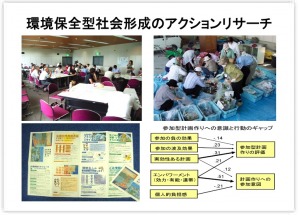Study of Environmental Awareness
| Lecturer | Yukio HIROSE, Professor |
|---|---|
| Department | School of Letters / Graduate School of Letters, 2008 Spring |
| Recommended for: | This class is aimed at students in second year and above, enrolled in the School of Letters. (2・1.5 hours / session One session / week 15 eeeks / semester) |

Course Contents
In this course we will examine, from a psychological viewpoint, the characteristics of awareness, attitudes and behavior towards environmental issues such as waste disposal, water treatment, transportation and energy sourcing, as well as analyzing the cause of behavior. Furthermore, we will investigate the significance of various research approaches such as action research, field experiment, quasi-experiment, social survey, and case study analysis, as well as the ways in which a psychological approach can help solve global and local environmental issues, by looking at cases of non-profit organizations and environmental volunteers.
Key Feature
Almost all environmental problems are the result of human actions, whether as an individual or in a group. Therefore, it is important to consider human psychology when trying to understand how people perceive and react towards environmental issues. In the first lecture, students will experience the effects of a simple environmental problem (arising from the illegal dumping of industrial waste) through 'game-simulation'. Based on this experience, students will hopefully come to perceive environmental issues as issues that directly affect everybody, positioning themselves in a way in which they can try to solve these issues.
There are many instances in which psychology has been used in researching various environmental problems that arise from the mutual dependence of humans and nature. However, we cannot go into all of these in detail, so this class will be focused more on environmental issues on a local level, such as garbage and recycling, drought management, contamination by household chemicals, energy conservation and public transport. We will investigate the ways in which psychology helps us to comprehend each respective issue; as well as consider what role psychology plays in finding a solution.
Course Aims
While exploring the ways in which people think about and act towards local and global environmental issues, students will think about what kind of role psychology plays in environmental conservation.
Foundation Courses
-
Environmental Psychology
-
Social Psychology
Textbook
-
The textbook used in the course is "Kankyo Koudou no Shakai Shinrigaku" (Social Psychology of Environmental Conscious Behavior), Ed. Hirose, Y., (Kitaohji Shobou) (2008) [in Japanese]
-
Additional materials will be distributed as necessary.
Additional Resources
-
Research into various approaches towards environmental issues
Gardner, G.T. & Stern, P.C. 1996 Environmental problems and human behavior. Allyn & Bacon.
Stokols, D. & Altman, I.(Eds.) 1987 Handbook of envioronmental Psychology. vol.2, John Wiley & Sons.
-
Research into environmental awareness and attitudes towards environmental issues
Ajzen, I.& Fishbein, M. 1980 Understanding attitudes and predicting social behavior. Prentice-Hall,Inc.
Craik, K.H.& Zube, E.H. 1976 Perceiving environmental quality. Plenum Press.
Boem, G. et al. (Eds.) 2001 Environmental risks: Perception, evaluation and management. Elsevier.
-
Research into the response towards environmental issues
Langston, S. (Ed.) 1984 Environmental leadership. Lexington Books.
Geller, E.S., Winett, R.A., & Everett, P.B. 1982 Preserving the environment. Pergamon Press.8
McKenzie-Mohr, D. & Smith, W. 1999 Fostering sustainable behavior. New Society Publishers.
-
Research into simulating environmental problems
Hardin, G. & Baden, J. 1977 Managing the commons. W. H. Freeman and Company.
-
Research into citizen participation in environmental planning
Renn, O., Webler, T., & Wiedemann, P. 1995 Fairness and competence in citizen participation. Kluwer Academic Publishers.
Smith, G. 2003 Deliberrative democracy and the environment. Routledge.
Assignments
An essay (see PDF) [in Japanese]
Course Schedule
Section One: What theories can help us explain people's concerns about the environment?
| Session | Contents |
|---|---|
| 1 | Experiencing game-simulations of environment problems |
| 2 | Can we solve social dilemmas that are linked to the environment? (Chapter 2) |
| 3 | How do people recognize the risks associated with environmental issues? (Chapter 1) |
| 4 | Can environmental action be considered altruistic behavior? (Chapter 3) |
| 5 | Why is there a discord between concern over environmental issues and acting upon that concern? (Chapter 4) |
Section Two: What methods should be used to encourage people to care more about the environment?
| 6 | Changing Attitudes: Increasing awareness by providing information (Chapter 5) |
| 7 | Behavior Modification (1): Controlling the factors that affect our behavior (Chapter 6) |
| 8 | Behavior Modification (2): Controlling the factors that affect our behavior (Chapter 6) |
| 9 | Methods of Motivation: Strengthening people's motives and intentions towards environmental conservation (Chapter 7) |
| 10 | Action Research: A recycling system established by volunteers (Chapter 8) |
Section Three: Solving Environmental Problems.
| 11 | Social Survey: Empowering citizens to participate in environmental planning (Chapter 9) |
| 12 | Quasi Experiment: The process in which the introduction of a new system for sorting garbage becomes socially accepted |
| 13 | Case Study Analysis: Creating mutual agreement between citizens and citizen participation in transport planning (Chapter 10) |
| 14 | Social Experiment: Evaluating an education program that encourages people to care for our environment (Chapter 11) |
| 15 | Summary / Final examination |
Lecture Handouts
All lectures are taught in Japanese.
Overview
Session #1
Session #2
Session #3
Session #4
Session #5
Session #6
Session #7/8
Session #9
Session #10
Session #11
Session #12
Session #13
Session #14
Grading
Students are evaluated based on their attendance (20%) and report (80%).
Last updated
May 08, 2020
